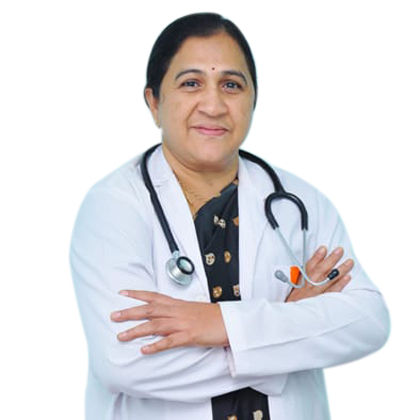How To Reduce Period Flow?
Heavy periods cause discomfort and can include other medical complications. So, learn the treatments and lifestyle remedies to reduce period flow.

Written by
Last updated on 3rd Jul, 2025
Menstrual flow is the natural part of the women’s reproductive cycle. However, its timing, duration, and intensity will vary from one individual to another. Typically, the menstrual cycle occurs once a month (28 days), and the bleeding lasts for 3 to 5 days and sometimes up to 7 days. However, some women experience heavy bleeding, a condition known as menorrhagia, which can be troubling. It leads to discomfort, fatigue, and anaemia in severe cases. Hormonal imbalance, lifestyle choices, and other underlying health conditions mainly contribute to the development of this heavy period flow. So, knowing the correct prevention methods can help women find relief and lead a normal life even during this painful period.
Lifestyle Changes
Specific dietary changes support reducing heavy flow during this period, and taking particular nutrients helps nourish the body. However, before taking any supplement, individuals should consult a doctor. Here are a few diet tips women should follow during this period –
During bleeding, individuals lose iron, which is essential for producing haemoglobin. Thus, their diet should include iron-rich foods such as spinach, legumes, liver, and other organ meats.
Vitamin C may reduce period flow. Thus, consuming vitamin C-rich foods like green chilli peppers, Kakadu plums, fresh parsley, etc., will be beneficial.
Drinking 4 to 6 cups of water will help maintain blood volume during heavy flow. Women can also drink electrolytes to balance the need for additional fluids in the body.
Cooking with cast iron cookware also helps the body to absorb iron effectively.
Light exercise and physical activity during periods decrease PMS (premenstrual syndrome) symptoms, improve mood, enhance power and strength, and fight against painful periods. Thus, light exercises are constructive.
Walking and light cardio support better functioning of the lungs during the post-menstrual cycle.
Yoga helps to reduce period symptoms and provides relaxation to the body.
Medical Management
Over-the-counter and prescription medications help to manage blood loss and reduce pain during bleeding. These include –
NSAIDs (nonsteroidal anti-inflammatory drugs) like naproxen sodium (Aleve) or ibuprofen (Advil) reduce blood loss and menstrual cramps.
Tranexamic acid (Lysteda) prevents blood loss during the menstrual cycle. These medicines should be taken at the time of bleeding.
Oral contraceptives regulate menstrual cycles. These ease the flow and provide relaxation during heavy or long-lasting bleeding periods.
Elagolix with progestin and oestrogen treats fibroid-related bleeding. Elagolix alone (Orilisa) can control bleeding due to endometriosis. Relugolix with oestrogen and progestin also controls the bleeding of fibroids.
Home Remedies and Natural Treatments
Home remedies and natural treatments help to manage heavy periods easily. Here are some of the practices –
Ice packs reduce the heavy flow of periods, and heating pads lessen the symptoms of periods, such as cramping and pain. The warmth of the pads relaxes the muscles, diluting cramps.
Herbal teas, including cinnamon, liquorice, ginger, and raspberry leaf, reduce uterus inflammation and regulate hormones.
Taking vitamin C and iron supplements helps with heavy bleeding. Iron supplements prevent anaemia, and vitamin C supplements help the body absorb enough iron.
A review from Phytotherapy Research shows that some other home remedies, such as myrtle fruit syrup, ginger capsules, and pomegranate flower capsules, provide profitable results for controlling bleeding.
When to See a Doctor?
If someone experiences heavy menstrual bleeding that lasts for more than 7 days, they should go to a doctor. The doctor asks the patient about her menstrual cycle and medical history and then conducts a physical check-up. After that, they will recommend some tests, which include –
Blood Test: It helps to check anaemia and other conditions such as blood clotting problems or thyroid disorders.
Ultrasound: The imaging test creates precise images of the uterus, pelvis, and ovaries.
Pap Test: For this test, the cells from the cervix are collected. Through these cells, the doctors check for any sign that may lead to cancer.
Endometrial Biopsy: In this case, the doctor collects cells from the uterus to check the signs of pre-cancer or cancer.
For some cases, additional tests may be required, which include –
Hysteroscopy: Through this test, the doctor checks the inside of the uterus. To do this, they insert a lighted and thin instrument through the vagina and cervix to check the uterus.
Sonohysterography: First, a fluid is injected into the vagina and cervix. Then, the doctor checks issues of the uterine lines through an ultrasound.
Get Your Condition Analysed
Hormonal Treatments
Hormonal birth control methods act as thinners of the uterine lining. It results in less menstrual bleeding and painful cramps. The options include -
Hormonal IUDs (intrauterine devices): They are small, T-shaped devices that the healthcare providers place in the patient's uterus. These IUDs release a consistent level of levonorgestrel. It is a synthetic progesterone or progestin that reduces bleeding for 3 to 8 years.
Combination Pills: They contain progestin and oestrogen, which reduce or regulate the heavy period flow. The combination pills should be taken for 21 to 24 days. Then, the patients should take 7 days of placebo or inactive pills.
Progestin-only Pills: These pills have been utilised as a continuous treatment option. Research suggests that high-dose progestin-only pills more effectively reduce heavy bleeding than low-dose pills.
Other hormone therapy includes –
Oral Progesterone: The natural progesterone hormone reduces heavy bleeding and fixes the issue of hormone imbalance. Progestin is a synthetic form of progesterone.
GnRH (gonadotropin-releasing hormone) therapies: These therapies become effective in certain cases, such as preparation for a surgical intervention. They reduce oestrogen levels, helping the uterine lining become thinner and shed. These therapies also help shrink uterine fibroids and endometriosis-related pelvic pain.
Surgical Procedures
In some critical cases, hormonal treatments don't provide effective results. Hence, doctors resort to surgery. Some of the options include –
Endometrial Ablation: This procedure destroys the endometrium, the lining of the uterus. The endometrium is destroyed through high-energy radiofrequency waves, microwave energy, or heated or extremely cold fluids.
Uterine Fibroid Embolisation: This surgical procedure aims to shrink uterine fibroids, which are some non-malignant tumours that cause too much bleeding. Thus, the doctor injects small particles into the blood vessels that supply blood to the fibroids. These particles create barriers to the vessel wall that stop the blood supply to the fibroids. When the blood supply is postponed, the fibroids shrink.
Managing Anaemia and Nutritional Deficiencies
Nutrient and iron-rich diets prevent anaemia due to heavy bleeding. So, individuals may prioritise a balanced diet with iron, folate, vitamin A, and B12. However, an individual must get a doctor's permission before taking any iron supplement. They must also avoid foods restricting iron absorption, such as tea, coffee, and cereals (oats and whole wheat flour).
Emotional and Mental Health Considerations
Apart from physical discomfort, heavy period flow causes emotional stresses such as anxiety, mood swings, irritability, difficulty in concentration, etc. So, here are management tips individuals could follow -
Stress management techniques such as meditation, massage, aromatherapy, breathing exercises, and muscle relaxation will be helpful.
Sharing feelings with someone can reduce depression. So, try strategies such as spending quality time with others, finding company when feeling alone, etc.
Therapy can reduce the symptoms of depression. Also, a therapist can guide the patients in learning stress and anxiety management techniques, identify causes of depression, and take preventive measures.
Plenty of rest and sleep are essential during periods. These help the body restore energy, reduce stress, and improve overall health.
Conclusion
Proper diagnosis and treatment can manage heavy period flows. While most cases can be managed with OTC medicines, home remedies, or natural treatments, doctors may suggest surgery in critical conditions. Depending upon the severity of the symptoms, they will recommend personalised treatment. Also, proper dietary changes and stress management strategies significantly lower the effects. To sum up, women suffering from heavy period flow should look at a more comprehensive approach to recovering from it and leading a pain-free life.
Consult Top Gynecologists
Consult Top Gynecologists

Dr. Parul Sharma
Obstetrician and Gynaecologist
8 Years • MBBS, MS (Obstetrics & Gynaecology)
New Delhi
THE DOCTORS NESST, New Delhi

Dr. Asha Rani Singh
Obstetrician and Gynaecologist
24 Years • MBBS DGO
Delhi
Dr Asha Rani Singh Clinic, Delhi
Dr. K Anusha
Obstetrician and Gynaecologist
4 Years • MBBS, DGO
Yemmiganur
SRINIVASAA HOSPITAL, Yemmiganur

Dr. Shyamala Devi
Obstetrician and Gynaecologist
38 Years • MBBS, MS Obstetrics & Gynaecology
Vijayawada
Sri Shivshakti Nilayam, Vijayawada

Dr. Sridevi Matta
Obstetrician and Gynaecologist
28 Years • MS ( OBG ), DGO, DNB Obstetrics & Gynaecology
Chinagadila
Apollo Hospitals Health City Unit, Chinagadila
(175+ Patients)


